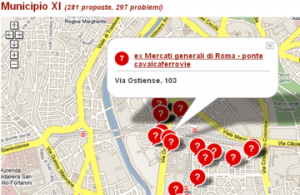Author Archive
 |
3. November 2010 – 18:05 by openpolis
|

There is no official repository of all the available public data in Italy.
Nothing like data.gov or data.gov.uk. Nor it seems there will be something even resembling it in a distant way, at least in the next few years.
And no, that’s not because our Public Administration lacks qualified or motivated managers and employees, or because of a diffused cultural attitude of ignorance and suspicion towards the new technologies in an ageing country ruled by an ageing political class. Both statements are prejudicial and false. We do have many greatly motivated managers (many young ones) in our PA, that understand perfectly the competitive advantages and moral appropriateness of putting public data, in standard and exchangeable formats, back in the hands of their owners: us the citizens.
Maybe it’s just that the subject is not ranked so important, as to trigger an organizational effort at a national level, comparable to data.gov.
The way to go with public data here seems to be the Do It Yourself way.
That’s exactly how the Spaghetti Open Data initiative was born a few weeks ago.
A small community of about 50 Public Administration employees and bloggers started assmbling links to sources of public data and to open software tools that can operate on them.
In a couple of weeks, the web site has been set up and it has just been launched today (nov, 3rd 2010). It contains links to 34 sources and 9 tools. It is open, it has been developed in an open standard, ready to be integrated into the italian CKAN.
It’s just a small seed, but it has the potential to grow fastly into a big tree of interconnected persons and projects. Maybe it will then be able to win a bit of attention and change the inertia of the central government with respect to this subject.
Posted in open data, Uncategorized | No Comments »
 |
1. April 2010 – 11:01 by openpolis
|
EU citizens may participate in EP and local elections in which ever Member state they live, but often they do not know or find obstacles to exercising their right. In Italy, only about 10% of EU citizens nationals have been admitted to vote in 2009 and candidates were hardly to be found. Please let us know if there is a similar participation gap in your country.
Because countries may do more to let residents from other EU Member states exercise their political rights, the European Commission has set a priority and welcomes funding project proposals aimed at promoting active participation in the democratic life of the Union. Priority will be given to projects focusing on the exercise of electoral rights of Union citizens in the Member State where they reside and of which they are not nationals. The Commission will support activities aimed at encouraging and supporting grassroots initiatives and projects carried out by associations in which non national Union citizens, residing in another Member State than their own, are involved” (Call for proposals JLS/2009-2010/FRAC/AG Action Grants, deadline 29 April 2010 – Programme “Fundamental Rights and Citizenship” for the period 2007-2013).
https://ec.europa.eu/justice_home/funding/rights/funding_rights_en.htm
Lara Olivetti, info [at] laraolivetti.net
ass. depp (openpolis)
Posted in Uncategorized | No Comments »
 |
1. September 2009 – 11:18 by openpolis
|
In this second article about Openparlamento.it, we’ll introduce the index of activity, an index we created to measure and compare, from a strtictly quantitative point of view, the activities of the elected officials in the Parliament.
The index has been publicly discussed in one of the openpolis mailing lists for some time.
What follows is a summary of the criteria used to craft it and how it was used to generate a report on the activity in the Italian Parliament, presented to the press in June.
Read the rest of this entry »
Posted in good practice, Projects, Tools | No Comments »
 |
21. July 2009 – 01:23 by openpolis
|

Rome, July 2009
After promoting different projects on e-democracy and e-partecipation in Italy (openpolis.it, voisietequi.it), the openpolis association, a spin off of the DEPP association, has officially presented to the public a new web application wholly dedicated to the monitoring of the italian Parliament: https://www.openparlamento.it.
This is the first of a series of three articles in which we describe some of the relevant features of the web application.
In this first article we describe the application, its vision and why, in our opinion, it can help build a base of informed citizenship and improve the democratic process.
The other two articles will focus on two particular instruments of the application, discussing various interesting aspects related to them that brought quite an array of reactions from the public.
openparlamento.it is a rather complex web application, where citizens can gather detailed informations on the proceedings of the acts presented by the elected officials at national level.
It allows one to follow an act in its path across the two perfectly symmetrical chambers (La Camera and Il Senato), from its presentation as a proposal, to its final approval.
It tracks all the votations, highlighting rebel voters. It tracks who presented an act, and wether as a first-signer or a co-signer. It also tracks speeches of officials on given acts.
Access to textual documents related to an act is easy and documents can be emended by users online, using an innovative shared comments system (eMend), that allows discussions on a particular act to take place.
Users can describe the acts, using their own words, in a wiki subsystem, acts are ratable and commentable, too.
All acts are tagged with consistent arguments by an editorial board, and that allows to know what’s going on and who’s doing what in relation to a subject.
An event-handling subsystem allows the generation of news. Whenever an act is presented, it moves towards approval or refusal, a votation takes place, someone gives a speech or anything worth noticing happens, news are generated. A dedicated web page and a customized daily e-mail, containing just the news related to those acts, politicians or arguments monitored by the user, allows him/her to follow almost in real time what’s going on.
Monitoring arguments is the most remarkable activity. Being time- and resources-consuming it is also not for free, though. A payment model is being discussed with the users during this free-demo phase, and we hope to come to reasonable commercial terms.
openparlamento.it sits on the shoulders of giants, those giants being TheyWorkForYou and OpenCongress.
The idea of materializing all the principles regarding the transparency of elected officials’ activities into a live web site was what we grabbed from those projects.
In Italy, public scrutiny is invoked as a distant and impossible principle. It is left to the official media and it is usually strongly biased, especially when it comes to the political arena.
We wanted to build a place on the web where citizens could inform themselves, controlling the activities of elected officials in the national parliament.
We asked ourselves: what if citizens could comment, rate and describe with their own words the acts presented by their representatives at La Camera and Il Senato? What if people could vote these acts so you can compare elected officials’ and citizens’ votes in the same context?
More than that, we wanted to give the public a tool that could help to understand a bit better what’s being done in the parliament and who’s doing what, and to possibly jump in the process, too. Uncensored.
That is one of the pillars of powerful lobbying: to know the real connections between the informations.
And that’s what we wanted the project to be: just a block of a series of tools that allowed for an improved relation between the represented and the representatives.
to be continued …
Posted in Projects | No Comments »
 |
13. November 2008 – 18:40 by openpolis
|

The D.E.P.P. association, is proud to be part of the Pep-Net group and we are culpably starting to post on the blog only today (after severe reprimands by the organizers).
D.E.P.P. (https://www.depp.it) is a non-profit organisation, based in Italy, that has been active in the last few yars both in the fields of partecipatory budget and of transparency.
In this first post I would like to describe the eDem project, which regards the partecipatory arena.
Back in 2004, D.E.P.P. won an Italian Government call on e-democracy, reaching the 4th position among 56 financed projects, and realized the eDem project, involving a number of local administrations, among the others: one of the local Municipalities of Rome.
The project revolved around a quite simple Web2.0 site, that allowed citizens to post problems and propose solutions and have them emerge by an integrated rating and commenting mechanism. An online discourse and continuous voting implementation, substantially.
Problems and solutions were categorized along two dimensions: territories and themes; the themes mainly regarded the array of issues addressed by the paricular partecipatory budget process already in place within the particular administration involved.
The web site aimed at becoming a tool for the integration of offline partecipatory budget processes with online ones, in order to shorten the gap with those segments of population tipically not involved, nor reachable in this kind of traditional partecipatory activities, i.e. students, minorities, families, busy commuters and so on.
To this end, the same crew of enablers that used to work in the offline discussions, were trained to use the platform. Offline discussions were reported in the web site, and the emerging problems and proposals on the site were reported back to local assemblies. The final votations were held offline, but the best-rated online proposals were admitted to the votations as well.
eDem was completely implemented using open source tools, with the collaboration of the National Research Council and is, as of today, available as a zip file, on the web site of the Domotics Laboratory of the CNR.
Mind the gap, though, you hackers out there, the code is open and free, but it lacks documentation.
The same source code was used to implement four different online partecipatory platforms, with different territories, thematic sections and communicational features, so it has fullfilled the requirement to be re-usable, which was explicitly requested in the 2004 call.
The final outcome of the project cannot be defined as a success, though. The number of total subscribers in the case of the local Municipality in Rome was 250, out of a total population of over 150’000. The total number of offline partecipants, though, was about 400, making it clear that it was not a tecnology barrier issue, but a precise political one.
There were no further fundings coming out of the italian government on e-partecipation, at least at a national level.
Posted in Projects, Tools | No Comments »









